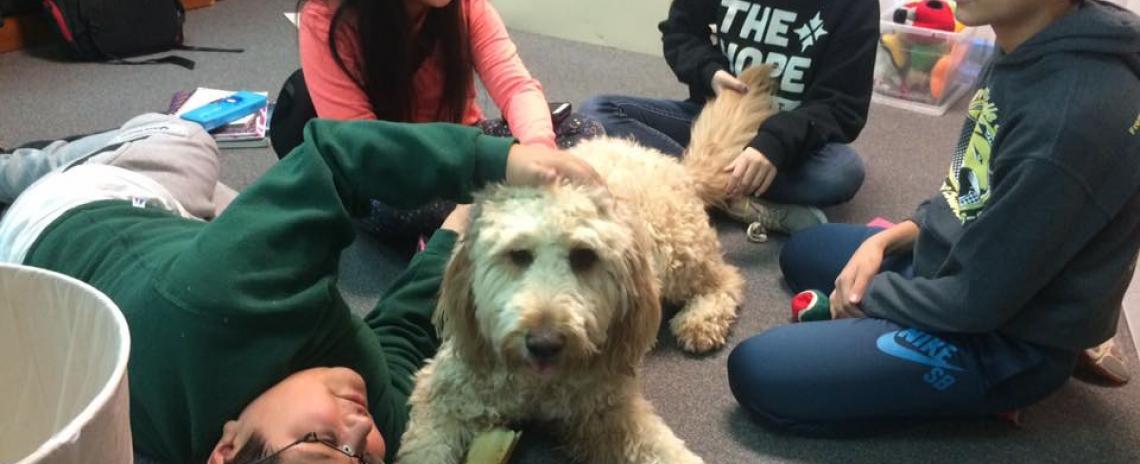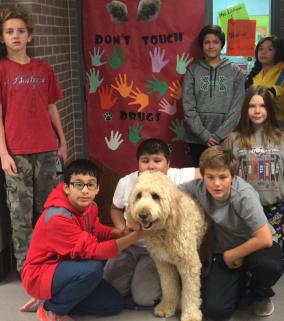The Winston Way: Fremont therapy dog "makes everybody happy"
The Winston Way: Fremont therapy dog "makes everybody happy"
By Tyler Dahlgren
Almost every morning, Winston trots into his workplace on all fours and becomes overwhelmed with excitement, announcing his presence to his friends at Fremont Middle School with an echoing howl.
Anne Echtinaw wishes her four-year-old golden doodle wouldn’t make such a noisy entrance, but the morning ritual isn’t entirely Winston’s fault.
You see, Winston is a popular pup. Very, very popular. Students are just as eager to see him in the morning as he is to get started on a new day. He howls, they howl.
“He loves coming to school,” Echtinaw, a special education instructor in her 17th year at FMS, said. “The howl is like him saying ‘Woohoo! I’m so happy to be here!’, and therapy dogs technically shouldn’t be barking like that.”
Winston can’t help himself. But he can help others.
After the passing of their collie, Echtinaw and her husband were looking for a puppy that didn’t shed. They found a golden doodle in the newspaper, took him home, and quickly noticed the natural attraction other people had to Winston, and vice-versa.
“Young people, old people, big kids, little kids, he had a draw to everybody,” Echtinaw recalls. “When I’d take him for walks, people were just drawn to him and his fuzzy hair or his goofy puppy dog eyes. People would always comment ‘I could take you home with me, you just make me feel so much better.’ Or ‘I’m glad I saw Winston, I was having a rough day’. These were unsolicited comments, too.”
Echtinaw saw an opportunity to bring an outside-of-the-box educational tool to Fremont. The district had recently received a $750,000 grant to implement Positive Behavior Intervention Systems (PBIS) through a new initiative, and after some discussions the therapy dog plan fit right in with rewarding positive behavior and was approved.
“Our superintendent, Mark Shepard, and our team of teachers were great about getting all of the data we needed to get this going,” Echtinaw said. “All around, the support has been phenomenal, from the faculty to the administration, and especially kids and parents.”
The Fremont Public Schools Board of Education added 50C.1 in 2015, a new policy outlining the ways in which a therapy dog can be implemented into the school setting. Winston completed his training through Domesti-PUPS, a nonprofit organization out of Lincoln with satellite locations in Auburn, Fremont and Omaha.
In January 2016, Winston showed up for his first day of school.
“I hadn’t had a dog in school before,” Echtinaw said of that first day. “I feel like I know a lot about dogs and their behavior, but this was an entirely new environment. I was really nervous wanting everything to go well. I spent the first few days following him around to make sure he wasn’t getting into something he wasn't supposed to.”
The final days of Winston’s fourth semester at the school are winding down, and things are a little different now. He has free reign of the 7C pod. If a teacher is giving a test or doesn’t want any interruptions, they will simply close their door. If it’s open, he will pop in the classroom to brighten everybody’s day.
“He kind of is who he is, and it was that way from the start,” Echtinaw said. “He is more aware of his surroundings. He is definitely more familiar with commands from other people, where before he was only taking commands from me.”
Winston is utilized in several ways.
“We have kids that have trouble reading, so they will take him on the floor behind the couch and read to him,” Echtinaw said. “We also have kids that learn by reading out loud, so if they have an assignment they want to work on, they go back there and read the directions out loud, a self-taught kind of thing, and Winston is right there for support.”
Therapy dogs are also used as a calming tool. Winston senses when somebody is upset and will navigate towards them, standing patiently in support, waiting for a good petting.
“If they don’t, he will wait a minute and walk away, almost like ‘Well, I guess they’re not ready to see me yet’,” she said. “We have had students with school phobia. They didn’t want to come to school, but we would go out to the car and they’d do me a favor and walk Winston in.”
He has a knack for knowing who needs him and when.
“Winston helps me stay calm when I’m upset or angry and makes me want to come to school,” said student Landen Eilts.
After seeing the impact her dog had on teachers and students (and the stories are incredibly heart-warming), Echtinaw became a trainer for Domesti-PUPS so she could train other teachers and their dogs. Fremont currently has four therapy dogs in the system, including a miniature golden doodle named Macy in pod 8C.
Through Domesti-PUPS, Winston worked the Olympic Swim Trials two years ago, the first-time therapy dogs had ever been used at an Olympic event. Recently, Echtinaw traveled to Denver to talk about the benefits of therapy dogs at work with the US Department of Agriculture management team.
“We talk to schools and college kids that are going into teaching about how they can use therapy dogs,” Echtinaw said. “We go to churches, assisted living homes and memory care facilities. We just get out in public a lot.”
In the past decade or so, Echtinaw said, teachers have opened their minds and broadened the creativity of their classroom methods in an effort to reach students. That’s especially true in Nebraska, and Fremont is a perfect example (NPSA featured Fremont’s Sensory Courtyard in January 2017).
“In Fremont, our administration is very forward thinking as far as doing whatever you can to engage with students,” Echtinaw said. “If you have an idea, they encourage you to go with it. They understand the need for creativity. They appreciate that and foster it by allowing teachers to try different things.”
Winston’s passion is helping his hundreds of friends at FMS and in the community (hee has a Facebook page with over 2,500 likes!), but, much like any teacher, he does have other hobbies outside of the classroom.
“The tennis ball is his life,” Echtinaw jokes. “It’s his reason for living. If we want to try to get him to do something unusual or different, we just have to get out the tennis ball.”
And though he’s on the move all day every, Winston usually catches a second wind at night and requires a few rounds of fetch with his beloved tennis ball.
On most days, he’s snoozing before Echtinaw reaches the highway back to Omaha.
“It’s kind of a weird thing,” Echtinaw said, glancing at Winston, who is opportunistically catching a quick nap in the corner of the room. “He gets all the attention, but I get all the good feelings from watching him and people’s reactions to him.”
Winston makes Echtinaw proud, and, as student Jessa Seely puts it, “makes everybody happy.”
“I am so delighted to share his affection with other people,” Echtinaw said. “Because it is very powerful.”



